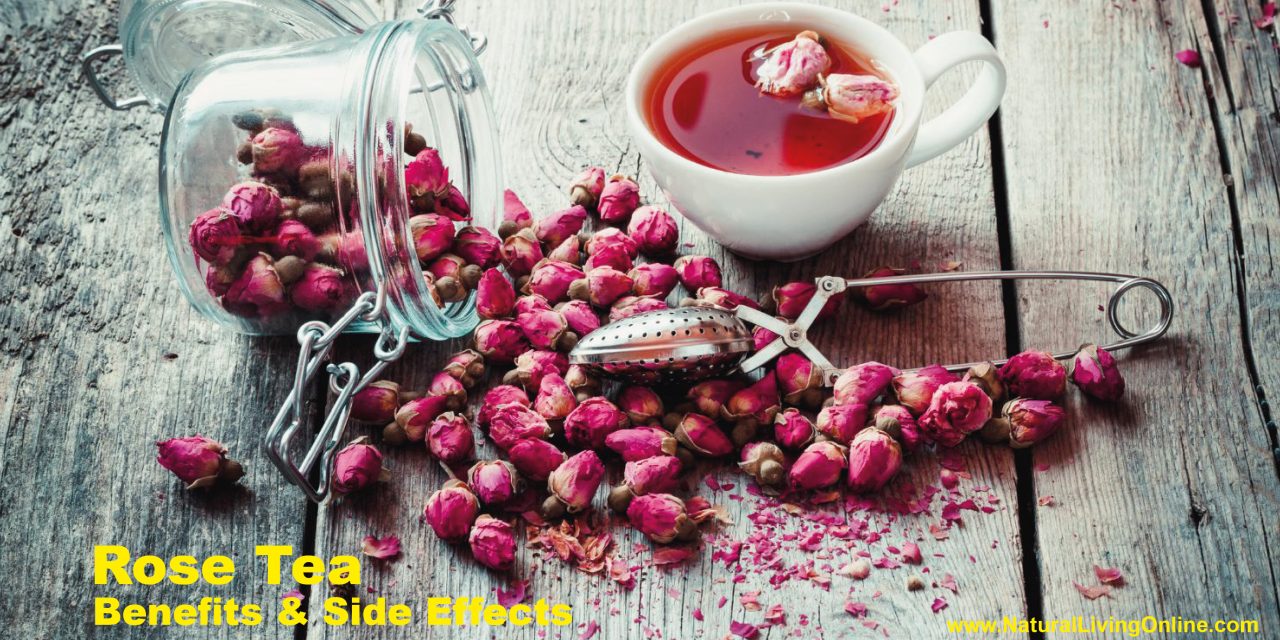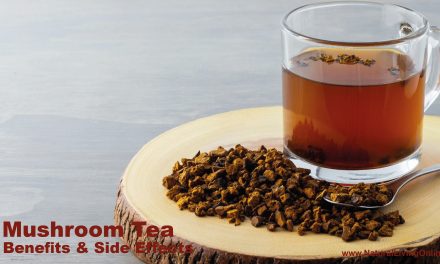Are you looking for a new tea to add to your daily routine? Rose tea might be just what you need. Made from the petals and buds of roses, this caffeine-free beverage is not only aromatic but also packed with nutrients. Rose tea is rich in antioxidants and vitamins, making it a healthy choice to boost your overall well-being.
Drinking rose tea can benefit your health in several ways. It has anti-inflammatory and antibacterial properties, which help improve digestion and relieve menstrual pain. Additionally, the vitamins E and C found in rose tea can promote better skin and hair health. With its immune-boosting qualities, adding rose tea to your diet can provide more than just a pleasant taste.
Ready to try rose tea? Preparing it is simple and can be easily incorporated into your daily routine. By including this delicious and nutritious beverage in your diet, you can enjoy its many health benefits while savoring its unique flavor.
Key Takeaways
- Rose tea is rich in antioxidants and vitamins.
- It helps improve digestion and relieve menstrual pain.
- Simple to prepare and incorporate into daily routines.
Nutritional Profile and Antioxidant Properties
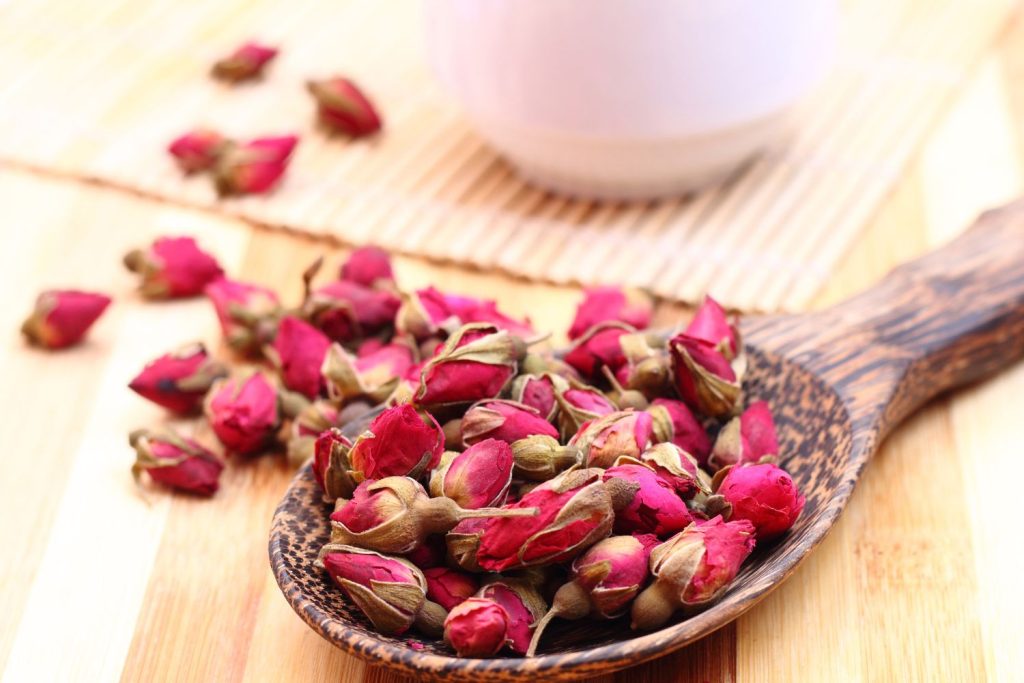
Rose tea, made from dried rose petals, is a valuable source of important vitamins and minerals. In addition to its nutritional benefits, rose tea offers a wealth of antioxidants that can support overall health.
Rich in Vitamins and Minerals
Rose tea stands out due to its high vitamin content. Specifically, it is rich in vitamin C and vitamin A. One cup of rose bud tea can provide approximately 7.5 mg of vitamin C, which helps boost the immune system and fend off common illnesses like colds and flu.
Besides vitamins, rose tea also contains essential minerals. Though in smaller quantities, these minerals contribute to the tea’s overall nutritional profile. Drinking rose tea can be a tasty way to supplement daily nutrient intake, particularly for those who may not get enough vitamins and minerals from other sources.
Antioxidant Compounds in Rose Tea
Rose tea contains several powerful antioxidants, including polyphenols, flavonoids, and gallic acid. Antioxidants are essential because they help neutralize harmful free radicals in the body.
One of the most significant antioxidants in rose tea is gallic acid, which comprises 10-55% of the tea’s total phenol content. Studies suggest that gallic acid has anticancer, antimicrobial, and anti-inflammatory properties.
Other flavonoids, such as quercetin and kaempferol, also contribute to the tea’s health benefits. These compounds have been linked to reducing inflammation and providing protection against various diseases. In summary, rose tea offers a range of antioxidants that support overall health and wellness.
Health Benefits of Rose Tea
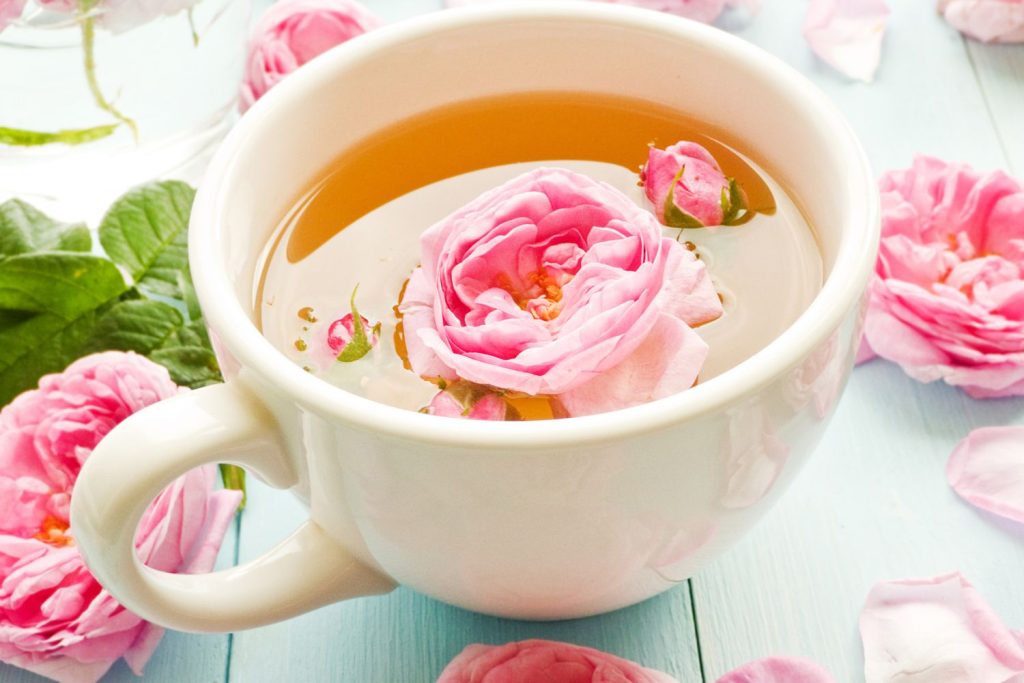
Rose tea offers numerous health benefits, from supporting the immune system to promoting better skin and hair care. This herbal drink can also help reduce pain, improve mood, and aid in digestion.
Supporting the Immune System
Drinking rose tea can boost the immune system with its rich content of vitamins C and E. These vitamins help the body fight off infections and common illnesses like colds and flu. One cup of rosehip tea alone can provide about 7.5 mg of vitamin C, bolstering the body’s natural defenses immune system.
Rose tea is also packed with antioxidants, which protect cells from damage and support overall immune health. The polyphenols in rose tea help to neutralize harmful free radicals in the body, reducing oxidative stress.
Digestive Health Advantages
Rose tea can enhance digestive health through its natural diuretic properties. This means it helps the body flush out toxins and prevents bloating. Regular consumption can also alleviate gastrointestinal issues like constipation and diarrhea by promoting regular bowel movements.
The anti-inflammatory properties of rose tea help soothe the digestive tract, making it beneficial for those with chronic stomach issues. Moreover, it can stimulate digestive juices and enzymes, aiding in effective breakdown and absorption of nutrients.
Pain Relief and Anti-Inflammatory Effects
Rich in gallic acid, rose tea provides significant anti-inflammatory benefits. This can be particularly helpful for those suffering from conditions like arthritis, where inflammation is common. By reducing inflammation, rose tea can lessen joint pain and improve mobility.
Menstrual pain can also be managed with rose tea, as it helps to relax the muscles and alleviate cramps. Its mild sedative properties can soothe the body and reduce feelings of pain and discomfort.
Skin and Hair Care
Rose tea is excellent for skin and hair care. The vitamins and antioxidants present in the tea help to nourish the skin, reduce wrinkles, and keep it hydrated. Regular consumption can lead to healthier, glowing skin by promoting collagen production and combating signs of aging.
For hair, the nutrients in rose tea support scalp health and can help to prevent dandruff. The antioxidants stimulate hair follicles, promoting faster and healthier hair growth. Drinking rose tea can make hair stronger and shinier.
Mood Enhancement and Stress Reduction
Consuming rose tea can significantly improve mood. Its soothing aroma and properties reduce stress and help in achieving relaxation. The tea contains compounds that can reduce anxiety and promote a sense of calm, making it helpful for those dealing with mood disorders or high-stress levels.
Additionally, rose tea can enhance sleep quality by promoting relaxation and reducing stress levels. Drinking a cup before bed may help ease insomnia and improve overall sleep patterns.
Rose tea is a versatile herbal tea with a plethora of health benefits that make it a valuable addition to your daily routine.
Preparation and Consumption
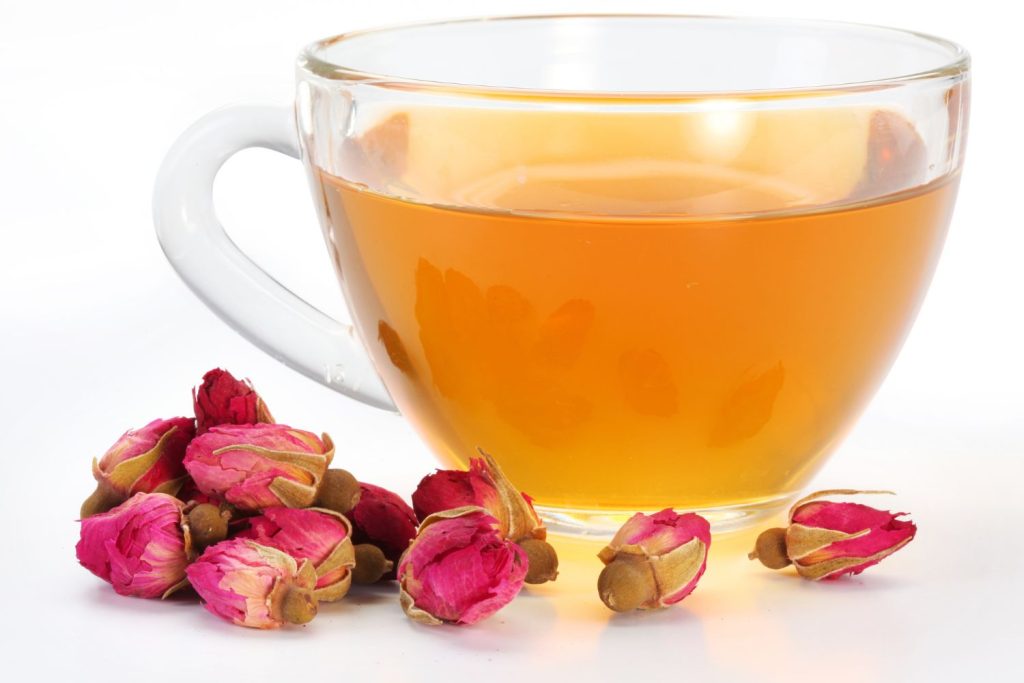
Rose tea is a simple yet delightful drink that can be made using either fresh or dried rose petals. Whether you want a soothing hot beverage or a refreshing cold one, preparation methods and best consumption practices ensure you get the most out of this caffeine-free tea.
How to Make Rose Tea
To prepare rose tea, start by choosing fresh or dried rose petals. For a basic recipe, you’ll need:
- 1 cup of dried or fresh rose petals
- 1-2 cups of hot water
- Optional: honey or lemon for flavor
Begin by rinsing the rose petals to remove any dirt or pesticides. Place the petals in a teapot or infuser. Pour hot water over the petals and let them steep for 5-10 minutes.
For those who prefer a stronger flavor, allow the tea to steep longer. Strain the rose petals before drinking. Adding a spoon of honey or a slice of lemon can enhance the taste.
Best Practices for Consumption
When enjoying rose tea, moderation is key. Drink one to two cups per day to reap its benefits without overconsumption.
Pair rose tea with a healthy diet and daily exercise for optimal results. This complements its digestive support and weight management properties.
Rose tea is great as an afternoon pick-me-up or a relaxing evening drink. Avoid excessive consumption, as it can cause adverse reactions in some individuals. Frequent but moderate consumption is more beneficial.
For those with specific medical conditions or allergies, consult with a healthcare professional before adding rose tea to your diet. This ensures safe and beneficial use of the beverage.
Potential Health Considerations
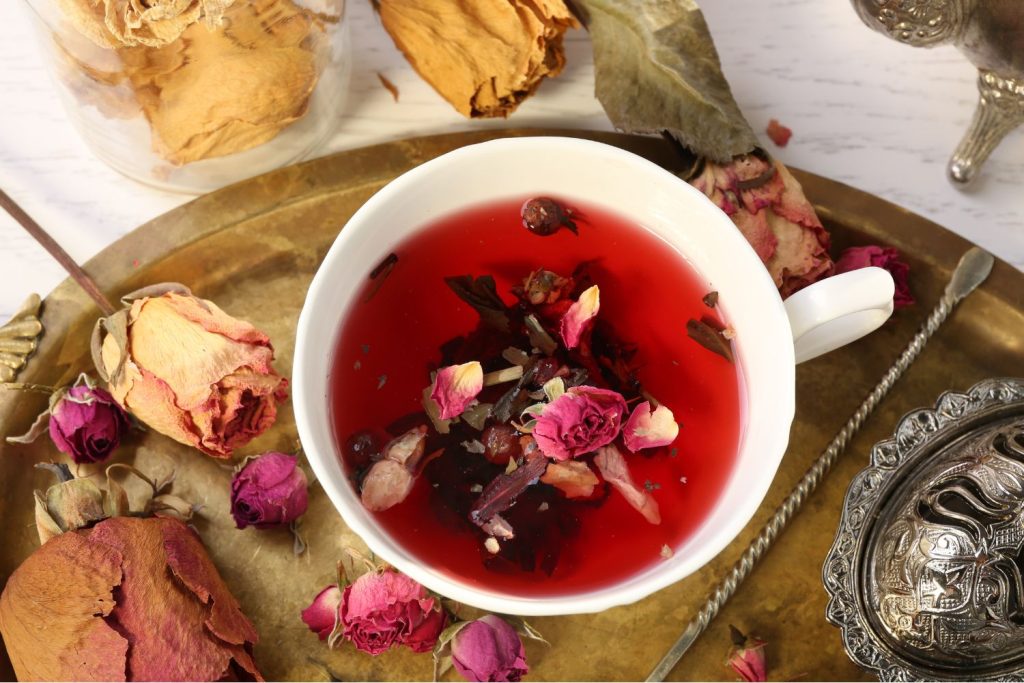
While rose tea has many benefits, there are important health considerations to keep in mind. This includes potential side effects and precautions during pregnancy.
Side Effects and Allergies
Some people might experience side effects when drinking rose tea. Side effects can include nausea or stomach cramps, especially if consumed in large quantities. It is best to drink rose tea in moderation to avoid any discomfort.
Allergic reactions to rose tea are rare but possible. Those who are allergic to roses might experience itching, swelling, or hives. If someone shows any signs of an allergic reaction, such as difficulty breathing, they should seek medical help immediately. It is crucial to monitor any new symptoms when introducing rose tea into one’s diet.
Precautions During Pregnancy
Pregnant women should be cautious when drinking rose tea. There is limited research on the effects of rose tea during pregnancy. Though generally considered safe in small amounts, it is important to consult a healthcare provider before consuming it.
Some compounds in roses might affect hormone levels, which could impact pregnancy. It is vital to avoid any herbal teas or supplements that haven’t been well-studied. Always prioritize guidance from a healthcare provider to ensure the safety of both mother and baby during pregnancy.
Comparison with Other Herbal Teas
Rose tea offers unique advantages that distinguish it from other herbal beverages. It provides potent antioxidant benefits and additional health advantages not always found in similar teas.
Rose Tea vs. Other Antioxidant-Rich Teas
Rose tea contains high levels of antioxidants, comparable to teas like green tea and black tea. These antioxidants help reduce oxidative stress and may lower the risk of chronic illnesses. In Traditional Chinese Medicine, it is believed to support emotional well-being.
Green Tea:
- Known for its catechins, it boosts metabolism and supports heart health.
- It has a more bitter flavor profile.
Black Tea:
- Contains theaflavins and thearubigins, which may improve heart health.
- Often enjoyed with milk and sugar.
Rose Tea:
- Rich in flavonoids and vitamins, such as vitamin C.
- It provides a milder, floral taste.
Unlike some other antioxidant-rich teas, rose tea may also help alleviate menstrual discomfort and improve skin health, making it a versatile addition to a healthy diet.
Unique Benefits of Rose Tea
One of the standout features of rose tea is its potential to ease digestive issues. Rose tea can help relieve bloating and indigestion, making it an excellent choice after meals.
Incorporating rosehip tea into the mix enhances these benefits. Rosehip tea, from the fruit of the rose plant, is particularly high in vitamin C, supporting immune health.
Rose tea is also praised for its calming properties. The floral aroma can act as a natural stress reliever, potentially aiding in better sleep quality.
It’s important to note that pregnant and breastfeeding women should consult a healthcare provider before consuming rose tea due to a lack of extensive research.
This combination of digestive relief, stress reduction, and skin health benefits distinguishes rose tea from other herbal teas.
Frequently Asked Questions
What are the potential benefits of drinking rose tea for the skin?
Drinking rose tea can improve skin health by providing a rich source of antioxidants. These antioxidants help to combat free radicals, which can reduce signs of aging. Additionally, rose tea contains vitamins E and C, promoting healthier and more radiant skin.
Can drinking rose tea contribute to weight loss?
Rose tea may contribute to weight loss due to its diuretic properties, which help to eliminate excess water from the body. It is also calorie-free and can be a good alternative to sugary drinks, aiding in reducing overall calorie intake.
What are the possible side effects of consuming rose tea?
Most people can safely consume 1-2 glasses of rose tea daily without negative effects. However, some might experience headaches or digestive issues. Pregnant and breastfeeding women are generally advised to avoid rose tea due to insufficient research on its safety during these periods.
Are there specific benefits of rose tea for hair health?
Rose tea can support hair health by providing essential vitamins that strengthen hair and prevent damage. The antioxidants in rose tea can also protect hair follicles from oxidative stress, potentially reducing hair loss and promoting healthier growth.
How might rose tea affect women’s health?
Rose tea can be beneficial for women’s health by reducing menstrual pain and discomfort. It also helps to stabilize hormonal imbalances, which can improve mood and reduce the severity of PMS symptoms.
Is it advisable to drink rose tea before bedtime?
Drinking rose tea before bedtime can improve sleep quality due to its calming properties. Rose tea is caffeine-free, making it an excellent choice for an evening beverage that promotes relaxation and prepares the body for sleep.
References:
Rose Petal Tea as an Antioxidant‐rich Beverage: Cultivar Effects
Determination of Antioxidant Properties of Dry Rose Tea
Rose tea for relief of primary dysmenorrhea in adolescents: a randomized controlled trial in Taiwan
Pharmacological Effects of Rosa Damascena
This website does not provide medical advice.
All information provided on this website, and on associated social media networks, including but not limited to texts, images, and numbers are for general information purpose only. It is not intended as medical advice and it does not include all possible precautions, side effects, or interactions that may occur. Neither NaturalLivingOnline.com nor its author/founder take responsibility for how you use this information. Statements contained on NaturalLivingOnline.com have not been evaluated by the FDA. You should conduct thorough research via multiple sources and consult your physician or qualified doctor before using any essential oil or herbal remedy. Information on NaturalLivingOnline.com must not be relied upon for medical, legal, financial or other decisions.

